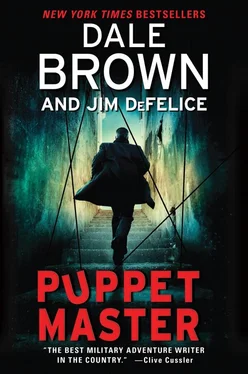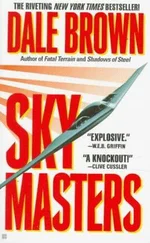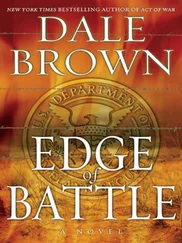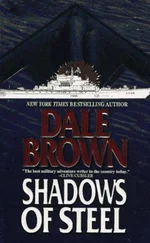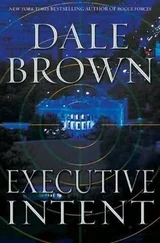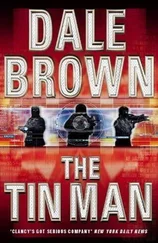The keyboard, though, had four rows of unmarked rectangles running above the joystick, which was flanked by a set of keys arranged in number-pad style. But these had symbols rather than numbers. And aside from an upside-down triangle and an infinity character, the markings bore no relation to anything found on a computer available at Best Buy.
“They fly themselves. But you can give them verbal commands,” explained Chelsea.
Flores reached for the keyboard.
“Don’t touch,” she said quickly. “It’s active during the boot up. Once this part of the screen goes green, then we’re good. It will take voice commands. I have to get the headset,” Chelsea added. “Can I trust you to keep your hands off?”
“We’re good,” said Jenkins. “No touching the entire time. This is all you.”
* * *
Jenkins settled onto the little bench at the front of the van while Flores checked in with the surveillance teams.
All this whiz-bang high-tech stuff — his head felt like it was spinning. He had trouble working the cable remote.
But this was the way of the future. If it didn’t involve a computer screen, it wasn’t real.
As kids, Jenkins and his brother solved crimes every day — usually several times. Their obsession began with a board game — Clue — their mom had bought from a garage sale. At the precocious age of seven and eight, respectively, the Jenkins brothers had become the Starsky and Hutch of Danbury, Connecticut. They solved the mystery of the missing cat, the misdelivered newspaper, and countless other crimes, big and small.
And then, both promptly forgot their obsession midway through high school. James found girls; Trevor found football. It was only after college that the younger Jenkins returned to the idea of becoming a detective, and it was in the most roundabout way: joining the Army after a failed collegiate career, he was recruited to CID by a friend from basic who was now a sergeant. CID — the Army Criminal Investigation Command — was the Army’s investigative corps. The vast bulk of the unit’s work, and certainly everything that Sgt. Trevor Jenkins was involved in, was extremely routine; his most exciting “case” was assisting an investigation into a string of barracks robberies. But the taste excited him, and he soon worked his way to police work, and from there to the FBI, with a brief stint in the Marshals Service in between.
His brother, James, was a bored industrial psychologist when Trevor joined the Bureau. It didn’t take long to rekindle his interest; when there was an opening in the Behavioral Science Unit, James took all of thirty seconds to decide to apply. Making the switch to a field agent was more difficult, but a foregone conclusion.
Now he was dead. Trevor Jenkins blamed himself, inevitably.
“We’re good to go,” Flores told him. “You want me to drop Ms. Goodman off?”
“She has to go alone,” said Jenkins, snapping from his reverie. “We watch, and move in if there’s trouble.”
“Got it.”
* * *
Luddite he might be, but the video from the Hums fascinated Jenkins. He’d expected that it would be moving. According to Chelsea and from what he could see on the control screen, the tiny aircraft circled over a set point in what she called an orbit with a five-hundred-meter radius. They were flying slowly, at about five miles an hour, but still, they were moving. So why didn’t the image?
Chelsea explained that the computer compensated, adjusting the data from the IR sensor in the nose so that the view was always fixed. This was easier for an operator to understand, she explained; more importantly, it provided a set of data quicker for the computer to manipulate.
“Manipulate, how?” asked Jenkins.
“Scan it for significant objects,” said Chelsea. “Movement, intensity — it’s all a matter of math. Let’s say we were using the sensor system to monitor an area for forest fires. We want to be able to discriminate between certain heat sources easily. It’s a matrix, really; you want to be able to quickly convert the values, and you want to do everything as efficiently as possible. That’s where we get into the architecture of the processing chip—”
“You lost me,” said Jenkins.
“It’s an arbitrary image,” said Chelsea. “A representation of what the computer is actually seeing.”
That didn’t really help, but Jenkins nodded as if it did. He glanced at Robinson, who was sitting at the side of the van, arms folded, quietly staring at Chelsea, as if he was trying to figure out how to ask her for a date.
An hour passed. Customers came and went, sometimes in bunches, most often in ones and twos. Nothing suspicious occurred. Robinson began talking about baseball and advanced statistics; Chelsea seemed to know at least as much as he did about them, certainly more than Jenkins.
“I’m going to stretch my legs,” said Jenkins. “Anybody want anything?”
“Is there a Starbucks near here?” asked Chelsea.
“On every block,” said Jenkins.
“I’ll come with you.”
“You have to watch the monitor.”
She took out her cell phone. “It’ll beep if there’s something up. I can pull up the image.”
Jenkins held the door open for her, feeling a little paternal, though he was a good ten years too young to be her father.
“They have a lot of Starbucks in San Diego?” he asked as they waited.
“Every corner.”
“I’ve never been there.”
“It’s a good place to visit. The weather’s always nice.”
“So I hear.”
They got her coffee — a blonde latte — and one for Robinson, then started back for the van.
“I’m sorry about Johnny,” said Chelsea. “But there’s hope at least.”
“Yeah.”
“Do you know who was in that truck?”
“They have a few leads — it’s a local matter.” Jenkins tried to hide his frustration — while he didn’t think the locals would do a bad job, he wanted to be on the case himself. But then he always felt that way.
“I heard the truck was stolen,” said Chelsea.
“Yup.”
“It didn’t seem to be connected to this.”
“I don’t think so.”
They walked a half block more without saying anything. Chelsea broke the silence. “Your daughter has one of our prosthetics.”
“That’s right,” said Jenkins.
“Your wife mentioned it. Mr. Massina will really help Johnny.”
“I’m sure he will.”
“Can he go back to work with you?”
“Probably not.”
In fact, it would be almost impossible for Johnny to return to the Bureau, at least in the sort of job he’d had. But that was something to worry about in the future. Right now, he just had to live.
Jenkins stopped. They were a few feet from the van. He took a long sip from his coffee, thinking of the night when his daughter had been brought into the hospital. It had been a desperate night; he was sure they’d lost her. And then when she’d recovered — seeing her without the leg the first time nearly undid him completely — he’d struggled to try and smile for her even as tears had flowed down the sides of his face.
His wife had been so much stronger.
“Your daughter’s away at college?” asked Chelsea.
“Yeah. USC. She wants to go into film. Be a director.”
“Nice.”
“I think she picked the school because it’s on the other side of the country,” chuckled Jenkins.
“It’s a really good school for film.”
“I think it’s a tough business,” he said, giving the answer he always gave. “But if it makes her happy.”
Chelsea’s phone beeped.
“I think we got something,” she said, reaching for the van door.
* * *
The figure in the infrared was five-eight and thin, dressed in jeans and a hooded sweatshirt. He’d taken something out of his backpack at the ATM, a walkup on the outside of a bank building three miles away. The Hum didn’t have a good enough angle to see what he did with it, but his hands were free as he left the machine.
Читать дальше
